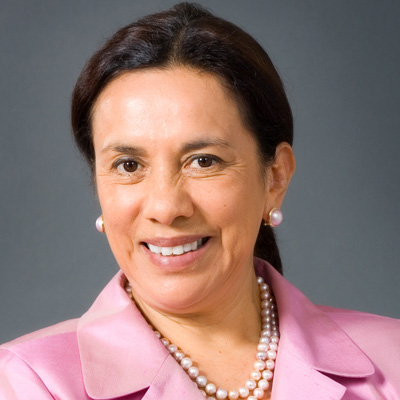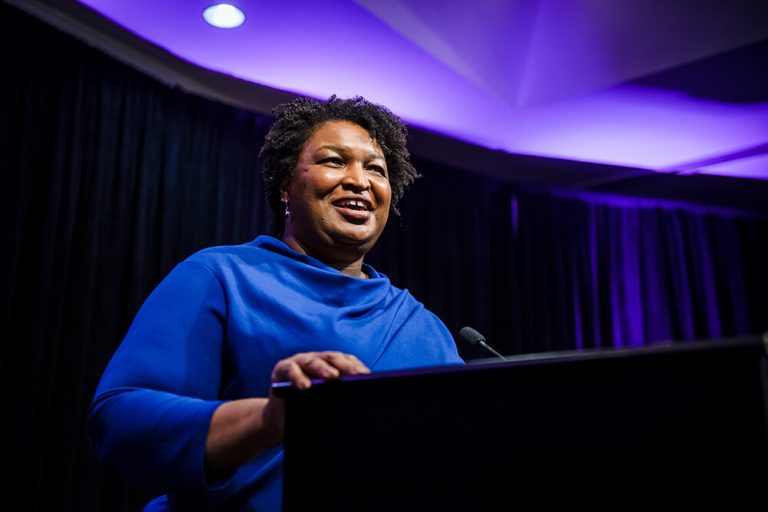FEW is celebrating the valiant women throughout history for Women’s History Month. FEW will shine a spotlight on some historic figures of our great nation that fought for justice, equality and inclusion. Visit throughout the month of March to read about ‘Valiant Women of the Vote: Refusing to be Silenced.’ This week, we are featuring Antonia Hernández and Stacey Abrams.
Antonia Hernández (1948- )

According to Antonia Hernández, she “went to law school for one reason: to use the law as a vehicle for social change.” Decades later, she can claim numerous legal victories for the Latinx community in the areas of voting rights, employment, education, and immigration. From legal aid work, to counsel to the Senate Judiciary Committee, to head of a major civil rights organization, Hernández has used the law to realize social change at every turn.
Antonia Hernández was born in Torreón, Mexico in 1948 to Manuel and Nicolasa Hernández. Her father had been born in Texas, but his family returned to Mexico after government officials forced Mexican Americans to leave the U.S. during the Great Depression due to job shortages. Hernández was the oldest of seven children. When she was eight years old, her family moved to the Maravilla Housing projects in East Los Angeles, where her parents worked in chicken factories, manufacturing, and gardening. Hernández endured taunts of “mojada” (“wetback,” a pejorative term for Mexican immigrants to the U.S.) from her classmates and neighborhood children. Despite the taunting, Hernández worked hard as a child, both in school learning English and on the weekends, selling her mother’s tamales across East L.A. alongside her father. In the summers, the family members were all migrant workers, picking crops from farm to farm. Hernández became politically active at a young age with the support of her father, who drove her to civil rights and Chicano movement protests in the 1960s. Her determination to fight for racial justice would continue through all her future endeavors.
Hernández graduated from Garfield High School in East L.A. and attended East Los Angeles College before she was admitted to UCLA as part of an affirmative action program. There she earned her B.A. in History in 1970, as well as her J.D. at the UCLA School of Law in 1974. Soon after passing the California bar exam, Hernández became a U.S. citizen. Reflecting on her U.S. citizenship in 1985, Hernández told the Los Angeles Times “I love [this country] more than most because I don’t take the rights and privileges of an American citizen for granted. I remembered there was a knot in my throat when I took the oath [of citizenship].”
Committed to working in civil rights law, Hernández began her career as a staff attorney with the Los Angeles Center for Law and Justice. There she worked on a class-action lawsuit (Madrigal v. Quilligan, 1978) that alleged the USC/Los Angeles County Medical Center conducted sterilization procedures on women who had just given birth and had not consented to the procedures. They lost in court, but the press attention the case garnered led the medical center and the state of California to enact reforms intended to prevent such violations in the future. Hernández then took a position as staff counsel to the Senate Judiciary Committee from 1979-1981, the first Latina ever to hold that position.
From the Senate Judiciary Committee, Hernández moved to the Mexican American Legal Defense and Educational Fund (MALDEF), where she served as Regional Counsel in Washington, D.C. In 1985, she became President and General Counsel of MALDEF. As President, Hernández directed the organization’s litigation efforts and advocacy programs as well as managed a multimillion-dollar budget and several field offices. MALDEF pursued important voting rights cases while under Hernández’s leadership. They filed federal suits in California, Texas, Illinois, Wisconsin, and Michigan that led to an end to gerrymandering and other discriminatory practices that prevented Latinx candidates from winning elections in those districts. MALDEF also defended The Voting Rights Act of 1965, which Congress expanded to cover Texas and other Southwestern states in 1975. These efforts included an amendment that explicitly outlawed discriminatory election practices and a provision that protected the rights of non-native English speakers. MALDEF also organized nationwide campaigns to promote Latinx participation in the 1990 and 2000 censuses, to better ensure equitable political representation for the Latinx community. Hernández led MALDEF’s legal pursuit of Latinx-majority voting districts across the country, most notably for the Los Angeles County Board of Supervisors (Garza v. County of L.A., 1990) and a Chicago-area congressional district (King v. Illinois State Board of Elections, 1995).
Stacey Abrams (1973 – )

Stacey Abrams is a political leader, voting rights activist and New York Times bestselling author. After serving for eleven years in the Georgia House of Representatives, seven as Democratic Leader, in 2018, Abrams became the Democratic nominee for Governor of Georgia, winning at the time more votes than any other Democrat in the state’s history. Abrams was the first black woman to become the gubernatorial nominee for a major party in the United States, and she was the first black woman and first Georgian to deliver a Response to the State of the Union. After witnessing the gross mismanagement of the 2018 election by the Secretary of State’s office, Abrams launched Fair Fight to ensure every American has a voice in our election system through programs such as Fair Fight 2020, an initiative to fund and train voter protection teams in 20 battleground states. In 2021, Abrams was nominated for a Nobel Peace Prize for her efforts in the 2020 election. Over the course of her career, Abrams has founded multiple organizations devoted to voting rights, training and hiring young people of color, and tackling social issues at both the state and national levels. In 2019, she launched Fair Count to ensure accuracy in the 2020 Census and greater participation in civic engagement, and the Southern Economic Advancement Project, a public policy initiative to broaden economic power and build equity in the South.
Abrams is a lifetime member of the Council on Foreign Relations, where she serves on the Subcommittee on Diversity. As a Next Generation Fellow of the American Assembly on U.S. Global Policy and the Future of International Institutions, she also served as a discussion leader, editor, and essay contributor. She was also selected as a Salzburg Seminar Fellow on East Asian Studies, an American Marshall Memorial Fellow, an American Council of Young Political Leaders Fellow, a Council on Italy Fellow, a British-American Project Fellow and a U.S.-Russia Young Leaders Fellow. As the top-ranking Democrat in Georgia, she traveled to and met with leaders in South Korea, Israel and Taiwan, and she worked closely with several members of the consular corps. Her international policy travel includes Australia, Austria, Belgium, Bulgaria, Canada, France, Israel, Italy, the Netherlands, South Korea, Switzerland, Taiwan and the United Kingdom. Abrams is a member of former Secretary of State John Kerry’s World War Zero bipartisan coalition on climate change. She has been a featured speaker at the Aspen Ministers Forum, the Kerry Initiative-Yale Jackson Institute of Global Affairs, the National Security Action Forum and the Council on Foreign Relations, as well as a contributor to Foreign Affairs Magazine.
She is a recipient of the John F. Kennedy New Frontier Award and a current member of the Board of Directors for the Center for American Progress. Abrams has also written eight romantic suspense novels under the pen name Selena Montgomery, in addition to the New York Times best-selling Lead from the Outside and Our Time is Now.
Abrams received degrees from Spelman College, the LBJ School of Public Affairs at the University of Texas and Yale Law School. Born in Madison, Wisconsin, she and her five siblings grew up in Gulfport, Mississippi and were raised in Georgia.”


